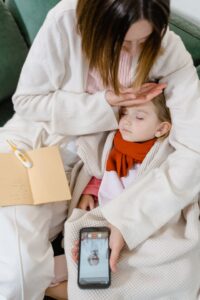What is whooping cough?
Whooping Cough in children, also known as "whooping cough", is a highly contagious respiratory infection caused by a bacterium called Bordetella pertussis. It mainly affects infants and young children, but people of any age can become infected.
Symptoms of whooping cough often include:
Initial symptoms (catarrhal stage): Common cold-like symptoms, such as runny nose, mild cough, low-grade fever, and fatigue. This phase usually lasts one to two weeks.
Coughing Stage: This stage is characterized by persistent, severe coughing episodes that often leave the child unable to breathe normally. After each coughing episode, the child may make a high-pitched "roaring" sound (similar to a rooster's crow), which is where the disease gets its name. Coughing attacks may be accompanied by vomiting and extreme fatigue, and this phase can last for weeks.
Recovery period: Coughing episodes gradually decrease but may last for weeks or even months.
How is whooping cough diagnosed?
Your doctor will take a sample of mucus from your nose and throat and may order blood tests and a chest X-ray to confirm whooping cough.
How to treat whooping cough?
Whooping cough is treated mainly with antibiotics. Antibiotics are most effective when given early (before the cough starts) and can shorten the length of infection. Even when used later, antibiotics can prevent the infection from spreading. If someone in your family gets whooping cough, talk to your doctor about whether you need preventive antibiotics or vaccine boosters for other family members. Infants and young children are more susceptible to pneumonia, difficulty breathing, hypoxia, dehydration and other problems. Hospitalization is often required.
Is whooping cough contagious?
Whooping cough is highly contagious. Spread by whooping cough or sneezing, the incubation period for whooping cough is usually 7 to 10 days but can be as long as 21 days.
Can whooping cough be prevented?
Getting the whooping cough vaccine (usually along with the diphtheria and tetanus vaccine, or DTaP vaccine) is the most effective way to prevent whooping cough. For very young infants, family members and close contacts are also recommended to be vaccinated for protection.
When should I call the doctor?
If your child has a prolonged cough and has been exposed to someone with whooping cough, symptoms include:
- The skin or lips become red, purple, or blue.
- Vomiting after coughing.
- There is a whooping cough sound.
- Difficulty breathing or appearing to have brief pauses in breathing.
- Looks sluggish.
- May become dehydrated.
If you encounter the above situation, please call your doctor as soon as possible.













